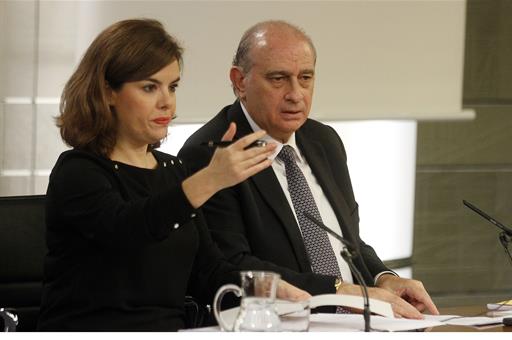Council of Ministers
Government provides National Police with a Personnel Act
Council of Ministers - 2014.11.21
Moncloa Palace, Madrid
The Council of Ministers approved a Draft Constitutional Law on National Police Force Personnel that seeks to unify and update the statutory regime in a single piece of legislation, adapting it moreover to the Basic Statute on Public Servants, announced the Vice-President of the Government, Soraya Sáenz de Santamaría.
The Minister for Home Affairs, Jorge Fernández Díaz, highlighted that the National Police Force will be renamed the National Police. He also pointed out that the future legislation is historic since it provides the National Police with a Personnel Act after almost 30 years of existence.
The new legislation establishes the rights and obligations of national police officers, improves their legal and social protection and will enable our citizens to have "an even more professional police force, if that is possible, which is better trained, closer to its citizens and more open to society", remarked the minister.
On this point, the Minister for Home Affairs recalled that Spain heads up the list of the safest countries in the European Union thanks to the civic responsibility of its citizens and the professionalism of its law enforcement agencies. He also pointed out that surveys conducted by the Sociological Investigation Centre (Spanish acronym: CIS) clearly show that the National Police and the Guardia Civil are among the most valued institutions by the Spanish people.
Other new features
The draft law establishes a list of individual and collective rights, from among which the minister highlighted the reconciliation of personal, family and working life, as well as the effective equality of treatment and opportunities for men and women. He also highlighted the right to adapt the functions of national police officers to their physical and emotional condition.
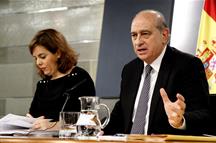 Pool MoncloaThe new legislation offers two fundamental guarantees to female police officers that have been victims of gender-based violence: unpaid leave or the possibility of taking up a new job position of a similar nature in another location without there necessarily existing a vacancy that needs covering.
Pool MoncloaThe new legislation offers two fundamental guarantees to female police officers that have been victims of gender-based violence: unpaid leave or the possibility of taking up a new job position of a similar nature in another location without there necessarily existing a vacancy that needs covering.
On another note, the text strengthens the protection for national police officers since it incorporates a civil liability insurance policy or another form of financial guarantee to cover compensation and bonds deriving from the performance of their duties.
As regards social protection, the minister also reported that the public administration will be obliged to take out an accident insurance policy - since 1973 this was ex gratia - in the event of death or total or partial permanent incapacity suffered by national police officers in the performance of an act of service.
The future legislation provides that the method for joining up will remain through open competitive exam, but increases the level of the qualifications required. In this regard, the minister explained that a high school diploma will be required in order to join up to the Basic Scale, and a university degree to join up to the Executive Scale. The level required for internal promotions has also been raised, although a transitional period of five years has been set. The minister clarified that "these qualifications are for joining up, hence for incoming police officers".
Jorge Fernández Díaz highlighted that the legislation provides for the possibility of career public servants from the police forces of the autonomous regions and local authorities signing up to the National Police.
Harmonisation of university degrees
On another note, the Council of Ministers approved a Royal Decree establishing the requirements and procedures for harmonising and standardising university degrees.
The new legislation sets the criteria for harmonising both degrees obtained overseas and those obtained in Spain prior to the Bolonia Accords. In both cases, a procedure is created to declare the correspondence of degrees at levels under the European framework for higher education, stated the Vice-President of the Government.
"This omission was primarily causing problems for our graduates, particularly when these graduates and business owners who want to hire them sought to validate their Spanish qualifications, for example, to sign projects in other countries", pointed out Soraya Sáenz de Santamaría.
Electricity 'bono social'
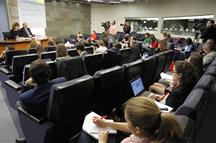 Pool MoncloaThe government also approved the methodology to calculate the percentages to distribute the cost of the 'bono social' (which, pursuant to the Electricity Sector Act, is the difference between the price for electricity paid by all domestic consumers and the tariff of last resort for those in the most vulnerable situations).
Pool MoncloaThe government also approved the methodology to calculate the percentages to distribute the cost of the 'bono social' (which, pursuant to the Electricity Sector Act, is the difference between the price for electricity paid by all domestic consumers and the tariff of last resort for those in the most vulnerable situations).
The Vice-President of the Government explained that this is a public service obligation whose financing falls on the utility operators that undertake generation, distribution and supply activities.
The distribution percentage will be calculated on an annual basis by the National Markets and Competition Commission, to which companies must provide the necessary information. Soraya Sáenz de Santamaría recalled that the amount of the 'bono social' for 2013 exceeded 228 million euros.
Association Agreement with Ukraine
The Council of Ministers submitted to Parliament, for its ratification, the Association Agreement between the European Union and Ukraine. Spain thus reaffirms its "political commitment to the maximum degree of compatibility between Ukraine and the European Union and to the development of far-reaching relations at all levels", in the same way as the rest of its European partners, pointed out the Vice-President of the Government.
Soraya Sáenz de Santamaría highlighted that Ukraine is the most important partner for the EU in Eastern Europe, due to its political and economic significance and that the agreement will translate into the creation of a wide-reaching free trade agreement.
Subsidy for the Gran Teatro del Liceo Foundation
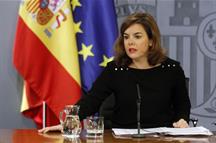 Pool MoncloaAmong the main agreements reached at the Council Ministers is the extraordinary loan to grant a direct subsidy to the Gran Teatro del Liceo Foundation. "The Central Government has guaranteed at all times that this institution will be maintained", as it has done in other situations of great difficulty in its recent history, and as it is doing in this instance", asserted the Vice-President of the Government.
Pool MoncloaAmong the main agreements reached at the Council Ministers is the extraordinary loan to grant a direct subsidy to the Gran Teatro del Liceo Foundation. "The Central Government has guaranteed at all times that this institution will be maintained", as it has done in other situations of great difficulty in its recent history, and as it is doing in this instance", asserted the Vice-President of the Government.
Soraya Sáenz de Santamaría added that in the season 2012-2013, the Liceo's deficit amounted to more than 4 million euros while the accumulated debt with different financial institutions amounted to more than 15 million euros, whence the Liceo's governing bodies approved a Strategic Viability Plan for 2017 which requires extraordinary contributions.
The State is thus comprehensively meeting those obligations it has taken on and is showing "its firm commitment to this institution" by paying close on 5 million euros, declared the Vice-President of the Government.
Ebola and PIVE Plan
Soraya Sáenz de Santamaría also reported on the concession of Spanish nationality to the African missionaries Paciencia Melgar and Helena Wolo for their collaboration in the fight against Ebola.
The government has assessed their personal record "in the service of others and the care and attention provided to those affected by Ebola, at great risk to their own lives", as well as their donations of serum to treat Teresa Romero and their willingness to continue collaborating in the search for a neutralising treatment, she said.
Finally, the Vice-President of the Government announced that at the next Council of Ministers, the extension to the PIVE Plan will be approved, with the same characteristics as the present plan. New vehicle registrations made as from Monday, 24 November will be valid under the new programme, she stated. There will thus be no interruption in the granting of subsidies, she highlighted.
Soraya Sáenz de Santamaría argued that this extension responds to the fact that the number of reservations has exceeded the initial forecasts in the successive editions of the programme and also because their results have been "very favourable" in terms of improving the trade balance, generating activity in the automobile sector and ancillary industries, as well as increasing employment and improving energy efficiency.
Current affairs
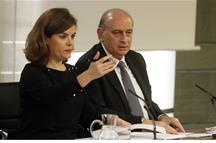 Pool MoncloaThe Vice-President of the Government, invited to take stock of the first three years of the legislature, remarked that it has been a period of very intense work, with a very ambitious structural reform plan, in which, thanks to the hard work from everyone, "we have managed to turn the situation around", and change "the negative sign for a positive one".
Pool MoncloaThe Vice-President of the Government, invited to take stock of the first three years of the legislature, remarked that it has been a period of very intense work, with a very ambitious structural reform plan, in which, thanks to the hard work from everyone, "we have managed to turn the situation around", and change "the negative sign for a positive one".
Today, she added, "Spain heads up the growth of all European economies"; "seven out of every ten workers that leave the unemployment queue do so in Spain" and, among other achievements, the public deficit is less than 6%. That is why our country is quoted as an example at the G-20 and at EU meetings. Moreover, Goldman Sachs has announced that Spain and Germany are the two "most powerful economies in the EU". What has been achieved during that which the Vice-President of the Government defined as the legislature of change "has not happened by chance, but by hard work and effort, which we must continue with, because we have not finished yet".
As an example of the measures already adopted that will be seen in the near future, she mentioned the tax reform approved on Thursday in the Lower House of Parliament. Soraya Sáenz de Santamaría explained that this is a reform "designed to principally benefit those on average incomes and, in particular, those on the lowest incomes. Those with annual incomes of less than 12,000 euros will not pay Personal Income Tax.
As regards Catalonia, and from a request from the opposition of "fewer legal actions and more politics", the Vice-President of the Government clarified that there is no dispute between politics and law, as some would like. "We all have to conduct politics within the law" and "this government does not see itself as above the political will of our citizens". Those who ignore the law quote politics as an excuse", she concluded.
As regards the spread of data about the aid worker from Doctors without Borders who came back to Spain due to the risk of contagion of Ebola, the Government Spokesperson reiterated the government's position regarding respecting the will of the party concerned and the organisation to which she belongs to not give out information on her identity or her state of health.
When asked about the granting of certain pardons, the Vice-President of the Government reported that the Council of Ministers has approved seven requests and denied more than 2,000, including Carlos Fabra and José María del Nido.





